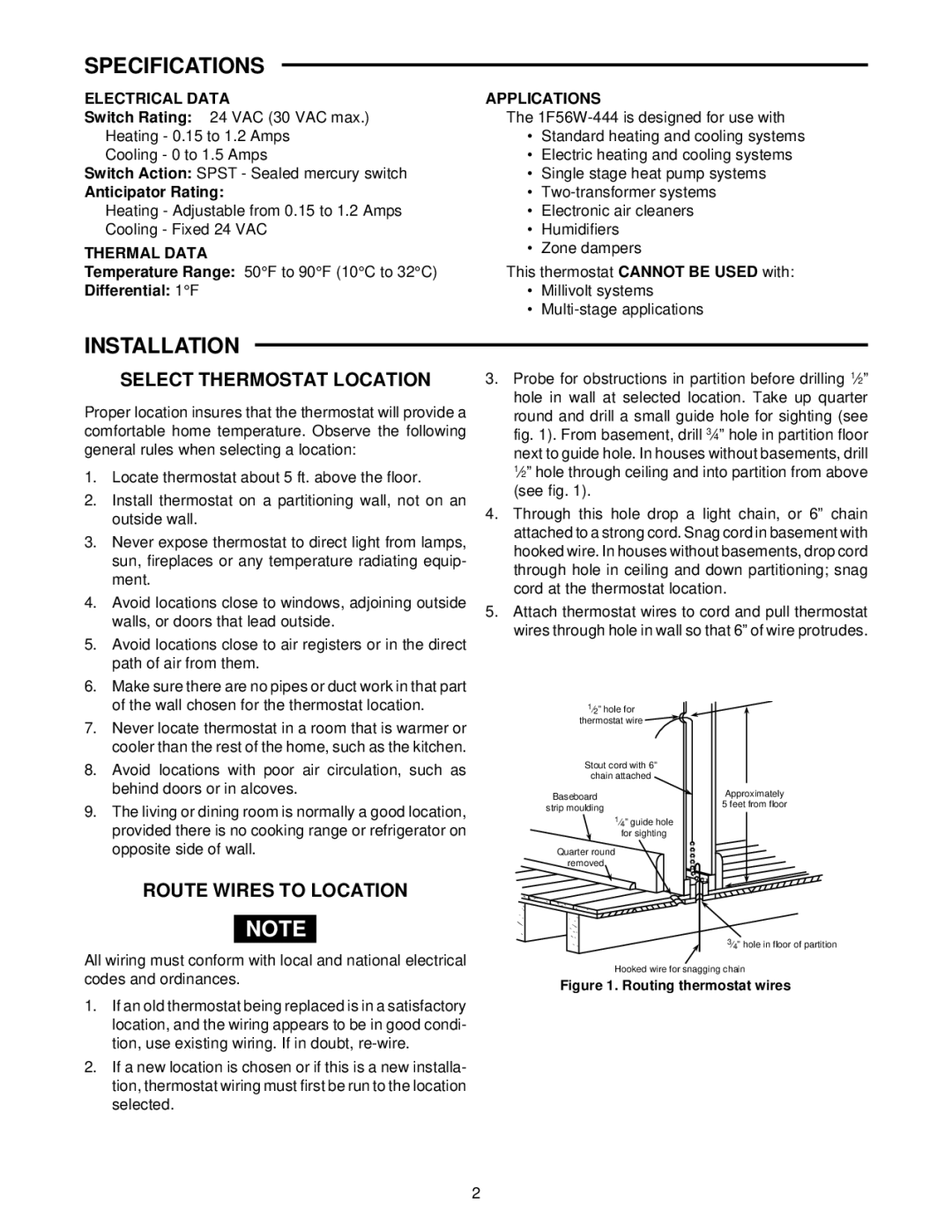
SPECIFICATIONS
ELECTRICAL DATA | APPLICATIONS | |
Switch Rating: 24 VAC (30 VAC max.) | The | |
Heating - 0.15 to 1.2 Amps | • | Standard heating and cooling systems |
Cooling - 0 to 1.5 Amps | • | Electric heating and cooling systems |
Switch Action: SPST - Sealed mercury switch | • Single stage heat pump systems | |
Anticipator Rating: | • | |
Heating - Adjustable from 0.15 to 1.2 Amps | • | Electronic air cleaners |
Cooling - Fixed 24 VAC | • | Humidifiers |
THERMAL DATA | • Zone dampers | |
|
| |
Temperature Range: 50°F to 90°F (10°C to 32°C) | This thermostat CANNOT BE USED with: | |
Differential: 1°F | • | Millivolt systems |
| • | |
INSTALLATION
SELECT THERMOSTAT LOCATION
Proper location insures that the thermostat will provide a comfortable home temperature. Observe the following general rules when selecting a location:
1.Locate thermostat about 5 ft. above the floor.
2.Install thermostat on a partitioning wall, not on an outside wall.
3.Never expose thermostat to direct light from lamps, sun, fireplaces or any temperature radiating equip- ment.
4.Avoid locations close to windows, adjoining outside walls, or doors that lead outside.
5.Avoid locations close to air registers or in the direct path of air from them.
6.Make sure there are no pipes or duct work in that part of the wall chosen for the thermostat location.
7.Never locate thermostat in a room that is warmer or cooler than the rest of the home, such as the kitchen.
8.Avoid locations with poor air circulation, such as behind doors or in alcoves.
9.The living or dining room is normally a good location, provided there is no cooking range or refrigerator on opposite side of wall.
ROUTE WIRES TO LOCATION
NOTE
All wiring must conform with local and national electrical codes and ordinances.
1.If an old thermostat being replaced is in a satisfactory location, and the wiring appears to be in good condi- tion, use existing wiring. If in doubt,
2.If a new location is chosen or if this is a new installa- tion, thermostat wiring must first be run to the location selected.
3.Probe for obstructions in partition before drilling 1⁄2” hole in wall at selected location. Take up quarter round and drill a small guide hole for sighting (see fig. 1). From basement, drill 3⁄4” hole in partition floor next to guide hole. In houses without basements, drill 1⁄2” hole through ceiling and into partition from above (see fig. 1).
4.Through this hole drop a light chain, or 6” chain attached to a strong cord. Snag cord in basement with hooked wire. In houses without basements, drop cord through hole in ceiling and down partitioning; snag cord at the thermostat location.
5.Attach thermostat wires to cord and pull thermostat wires through hole in wall so that 6” of wire protrudes.
1⁄2” hole for |
| |
thermostat wire |
| |
Stout cord with 6” |
| |
chain attached |
| |
Baseboard | Approximately | |
5 feet from floor | ||
strip moulding | ||
| ||
1⁄4” guide hole |
| |
for sighting |
| |
Quarter round |
| |
removed |
|
3⁄4” hole in floor of partition
Hooked wire for snagging chain
Figure 1. Routing thermostat wires
2
